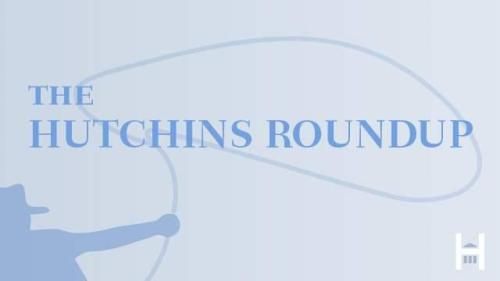Studies in this week’s Hutchins Roundup find that expectations of future economic growth have plummeted due to the coronavirus outbreak, low job switching rates have put downward pressure on inflation, and more.
Want to receive the Hutchins Roundup as an email? Sign up here to get it in your inbox every Thursday.
Expectations of future economic growth plunged in response to the coronavirus outbreak
Using data from the equity market and dividend futures, Niels Joachim Gormsen and Ralph S. J. Koijen from the University of Chicago quantify how investor’s expectations about future economic growth has evolved in response to the coronavirus outbreak. They use dividend futures—which are claims to dividends on the stock market as a whole in a given year—to estimate a lower bound for expectations of future growth over various time horizons. They find that the 11% drop in the stock market on March 16 reflected a 1.5% fall in expected annual GDP growth in the U.S. and a 2% fall in the EU compared to the beginning of the year. In addition, the lower bound of expected GDP growth for the next three years fell by 10% in the US and 12% in the EU. The authors show that news of economic relief programs on March 13 increased stock prices by lowering risk aversion and boosting long-term growth expectations but failed to improve short-term growth expectations.
Lower job switching rates puts downward pressure on inflation
Inflation historically increases in a tight labor market and falls in a slack labor market. But, in the last decade, inflation has remained subdued despite record low unemployment. Using the Survey of Consumer Expectations, Renato Faccini of Queen Mary University of London and Leonardo Melosi of the Federal Reserve Bank of Chicago argue that one factor behind the lower-than-expected inflation rate is the fact that the fraction of employed workers looking to switch jobs declined from 2014 through 2017. A lower rate of job switching, they say, reduces wage competition between firms, leading to lower labor costs and lower inflationary pressures. The authors also find that the drop in the rate of job switching after the recession increased labor misallocation, keeping workers in suboptimal jobs and slowing the rate of productivity growth.
Official statistics understate investment in emerging market firms
Global financial firms often finance themselves through foreign subsidiaries in tax havens to evade taxes and capital controls, obscuring the origin of their investments in aggregate financial statistics. Combining information from seven main commercial sources, Antonio Coppola from Harvard, Matteo Maggiori from Stanford, Brent Neiman from the University of Chicago, and Jesse Schreger from Columbia associate subsidiaries with their ultimate parent firm and with their ultimate parent firm’s country. They find that the misstatement of nationality in official statistics leads to a vast underestimate of the scale of portfolio investment from developed countries to firms in emerging markets. For example, they show that the U.S.
national accounts understate the magnitude of the investments in Chinese firms from the U.S. by $600 billion, while China’s official net creditor position to the rest of the world is overstated by 50%. The authors conclude that their methodology provides a foundation for improving the characterization of capital flows in international macroeconomic data.
Chart of the week: Unemployment insurance claims spike as coronavirus spreads
Quote of the week:
“We see that it is likely that the measures we take to protect ourselves from the virus will involve withdrawing from or reducing certain activities – thinking there of travel, leisure, hospitality, those things. And that’s going to mean lower economic activity for a period of time. These are appropriate choices that we make to protect ourselves from the virus. So that means that the second quarter is probably going to weak; in fact, in the view of many, output lower in the second quarter than it was in the first quarter. After that it’s very hard to say how big the effects will be or how long they will last. And that’s going to depend, of course, on how widely the virus spreads, which is something that is highly uncertain, and I would say in fact unknowable,” says Jerome Powell, Chair of the Federal Reserve Board of Governors.
“We do know that the virus will run its course, and that the U.S. economy will resume a normal level of activity. In the meantime, the Fed will continue to use our tools to support the flow of credit to households and businesses and support demand with monetary policy ultimately to do what we can to see that the recovery is as vigorous as possible.”












Commentary
Hutchins Roundup: Declining growth expectations, lower job switching rates, and more.
March 19, 2020